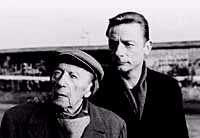For the second time ever - a few hours ago - I took in Wenders' best-known film, one with a failed since pretentious English title, so I won't mention that, but will describe the film well enough for you to recognise it. And it's about a Berlin pretty exactly two decades ago, so that alone motivated me.
 In the '87 film we follow the "life" of two guardian angels in the then more ruined biggest German city. They cannot be seen by adult humans, but often hover near the latter, occasionally trying to soothe by touching them, or leaning their heads lovingly against their fleshly "children". Especially one angel, Damiel, played by German acting icon Bruno Ganz, becomes a yearning voyeur of human life and one human woman in particular, so much so that... But that would be telling a little too much.
In the '87 film we follow the "life" of two guardian angels in the then more ruined biggest German city. They cannot be seen by adult humans, but often hover near the latter, occasionally trying to soothe by touching them, or leaning their heads lovingly against their fleshly "children". Especially one angel, Damiel, played by German acting icon Bruno Ganz, becomes a yearning voyeur of human life and one human woman in particular, so much so that... But that would be telling a little too much.
Peter Falk plays himself in the movie. He does a Cassavetian acting job, in a film in which the actors often start off in their native tongues, and may or may not end up in German dialogues. The film has other literary attitudes (l.a.'s) - who cares? Some texts work rather well, and the l.a.'s never become loud enough to disallow glossing over.
What touches me most about the film is - what else? - the view of Berlin. It's a great, dark, often tawdry, bulk here, its grandeur mostly ruined by the pretensions of occupants gone by; in fact they are only briefly cited in a "film within the film" which is shot partly in the old Hitler bunker, a "film" that's being shot with Falk starring in it. At the end of the Eighties Berlin's an exciting city for young people to be, and it seems in the film a place where older people are still holding on to some of their previously whole lives. Especially the latter have all but disappeared by now - much else of the life seen in the movie seems to me to have remained the same. Of course one prominent feature was still standing when this production was shot: The Berlin Wall; it plays a major supporting role, and we are shown it in many guises, not only from the subversively colourful West side, but also from the pale East. So perhaps the film even contains mild political allegory.
The film captures well the rush young people felt when hearing of, or actually landing up in, Berlin. I was one of them in '86, although only visiting briefly then.
And the angels are cool. I wonder if my seeing it end of the Eighties made me keep my pony tail until now? All I still need to finally occasionally asymptotically achieve "cool" is a long dark coat and a lighter shawl. So simple.
I think angels and demons were the role-playing characters, at least in the minds of the Catholic devout, of centuries ago, when common people had to be much less open about their fantasies and desires than today. If I were to play the angel game today - okay, I still need the coat, I know, I'll buy myself one for Christmas, promise - I'd want to be Cambiel, please, the one responsible for allowing unconventional thought.
In Berlin we trust.
... Comment


